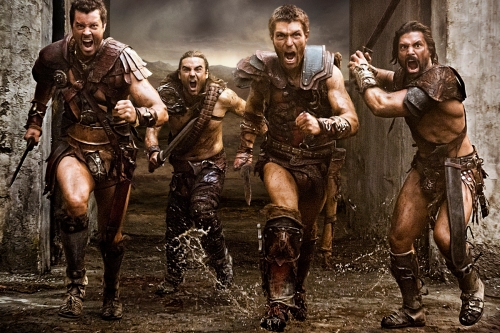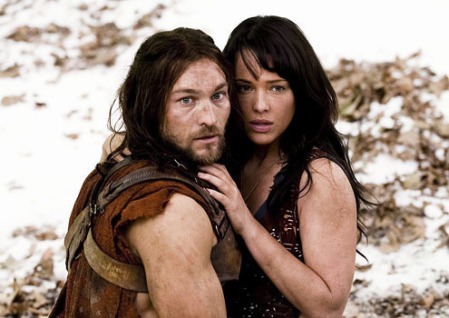The Persistence of Vision and Rear-View Mirror of ‘Spartacus’
by Ross Crawford
SPOILER WARNING: I talk about the absolute last moments of Spartacus.
Don’t read unless you’ve watched the full series. Seriously.
Spartacus, the perennially misunderstood television series, has just completed its consistently spectacular run with a triumphant finale. Widely and wrongly maligned by many critics for what they regard as its obsession with sex and gore, dedicated fans were last week ‘rewarded’ with a heart-rending conclusion. Rest assured, tears were shed. More accurately, gross sobbing ensued.
But now that my shattered psyche has returned to a relatively stable, functional level, I have begun to reflect upon the series as a whole. Spartacus began somewhat inauspiciously with the pilot, ‘The Red Serpent’, which aped the visual style of Zack Synder’s 300, with little obvious originality or flair. However, within a handful of episodes, Spartacus found its own unique groove: many fans cite episodes four and five (‘The Thing in the Pit’ and ‘Shadow Games’) as definite turning points in quality. Ultimately, the pilot misrepresented the series, which raised the stakes and upended the status quo so frequently, one could barely pause for breath.
However, what is fascinating about the final series of Spartacus, particularly the final three episodes, ‘Separate Paths’, ‘The Dead and the Dying’ and ‘Victory’, is how much it engages with, and even embraces the flawed opening moments of the show.
Few long-time fans would ever have anticipated Sura’s pseudo-prophecy from the pilot would be important in the show’s final moments:
Sura: The gods came to me last night in my sleep.
Spartacus: What did they show you?
Sura: My husband on his knees, bowing before a great red serpent. The life draining from his veins.
Spartacus: What meaning did you take from it?
Sura: A warning. If you go to war, you are destined for great and unfortunate things.
Many may have assumed Sura’s augury was averted/fulfilled by Spartacus during his first gladiatorial contest in the pilot, in which he fells the ‘red serpent’ gladiator. However, before the final climactic battle in ‘Victory’, Spartacus looks out at the vast horde of Roman soldiers assembled by Crassus to finally halt his slave rebellion. Spartacus turns from this foreboding sight and his eye is caught by Agron’s makeshift shield/sword combo, adorned with a ‘great red serpent’. Recalling his wife’s prophecy, he whispers to himself, ‘great and unfortunate things’. After the thunderous, bloody struggle that follows, Spartacus is finally laid to rest buried beneath this very shield. Sura’s prophecy that many had forgotten or ignored, ultimately came to pass.
This engagement with the inception of the show is also exhibited in Crixus’ rousing speech before his own final, fatal battle in ‘Separate Paths’. In episode two of Blood and Sand, Crixus’ Doctore, Oenomaus, had demanded, ‘What lies beneath your feet?’. Crixus, the subordinate, the slave, the mere gladiator, answered, ‘Sacred ground, Doctore. Watered with the tears of blood’. Years later, standing at the head of a vast army of his own followers, Crixus asks this very same question. He is answered by Agron, his long-time rival, who proudly echoes the words Crixus uttered so long ago. Yet as Crixus notes, this time it will be Rome herself, not her slaves, who sheds this blood. By the end of the series, Crixus had developed into a teacher worthy of Oenomaus and a leader the equal of Spartacus. Finally in sight of Rome and with victory within their grasp, Crixus encourages his followers with a final roar of, ‘Shall we begin?’. In episode three of Blood and Sand, he had strode into the arena in Capua with a cocky, self-assured shout of ‘Shall I begin?’. Years of character-development encapsulated in one single instance of pluralisation.

Crixus in ‘Separate Paths’
There are numerous other examples of this backward glance, including Spartacus and Crixus parting ways as true brothers (not merely as brothers ‘in another life’) and Crixus’ funeral in ‘The Dead and the Dying’, in which the mourners shout out the names of their fallen friends, lovers and allies. These moments allow the viewer to reflect upon and process the epic journey these characters have undergone.
Of course, much of this is classic bookending: a framing device recalling the images, phrases and themes from the beginning of the story. This technique emulates our own tendency as human beings to define ourselves by what has come before, whether it be our own personal history or our wider shared history. Such a thoughtful approach may seem at odds with the breakneck pace of the show, yet the true focus of Spartacus has always been character-development. If this was idle nostalgia, self-indulgently wheeled out by the writers, there would be no emotional resonance to speak of. These allusions are utilised sparingly and organically within the ongoing narrative to elucidate themes, point out parallels and indicate character growth.
Yet if the opening of the show is so fraught with problems, why do references to these early moments pack such a significant emotional punch?
‘The Red Serpent’ may be somewhat deficient as a standalone episode and gateway into the series but many of its acknowledged problems fade in significance upon revisiting it after the conclusion of ‘Victory’. However flawed, it contains the seeds of greatness that later allowed the series to flourish. The doomed love story of Spartacus and Sura may initially strike of a Gladiator copycat but to the credit of the writers, it was not abandoned once Spartacus’ rebellion was up and running. Indeed, it served as a catalyst for nuanced explorations of the morality of revenge. Throughout the remainder of the show, Spartacus is haunted by visions of his departed wife, reaching an apex in his vicious final duel with Crassus. Each furious swing of his sword is punctuated by an intense flashback of his lost loved ones.
Strange as it may sound, Spartacus’ fury is not directly aimed at Crassus. After the climax of the aptly named second series, Vengeance, Spartacus achieved his own personal motivations by killing Glaber, the man who sold his wife into slavery. However satisfying for Spartacus and indeed the viewer, this retribution was arguably self-indulgent and maybe even rang a little hollow. By War of the Damned, he has a higher goal: the liberation of all those enslaved by Rome. To Spartacus, each freed slave represents his wife, Sura. This transcendence of the self allows Spartacus to embody the ideals of freedom. In much the same way, Crassus personifies the ideology of Rome and her unwavering support of the institution of slavery. Therefore, their final fight is a clash of ideologies, more than a conflict between personal enemies.
Steven DeKnight and the other writers have acknowledged the problems of the pilot episode, yet crucially they do not seem ashamed of it. Many television shows are deliberately malleable, allowing critical backlash (or praise) to shape their ongoing narrative. Often, this is to the detriment of the story. The writers of Spartacus stuck fast to their own distinct vision and ultimately created an entirely cohesive, coherent and outright thrilling television series.
Lesser shows would never recover from the tragic premature death of their lead actor (in this case, the late, great Andy Whitfield), yet Spartacus went from strength to strength thanks to characteristically exceptional writing. Indeed, it is a testament to how much Liam McIntyre inhabits the role that despite frequent flashbacks to the pilot, we almost forget he did not portray our eponymous hero until Vengeance.
So, with a fitting look in the proverbial rear-view mirror, there is real pleasure in knowing the show is so structurally impeccable and thematically consistent from beginning to end. But incidentally, it was also a damn good time!
Spartacus, long may your cock rage on!


Excellent post! I’ll never tire of reading about Spartacus and hope that people will continue to discover it for years to come.
The first episode is unfairly maligned I think, and you’re right that it benefits immensely from a rewatch after seeing where the show goes in its later seasons. The real problem is that the pilot is burdened by too much story that it has to get out of the way before the show can get to the real meat. Most of the elements of the show that it would become aren’t even present in the pilot nor are many of the characters that we’d grow to love.
It’s also true that it presents something of a barrier for new viewers in its gratuity, but the real problem is that this gratuity has no context yet for it to make sense in terms of the themes of the show as a whole. Its not like Spartacus ever became any less gratuitous after all. Really it should be watched in tandem with the second episode, which I really think should be viewed as the 2nd part of the pilot. If the first ep introduces Spartacus, then the second brings in the rest of the show.
Anyway, random ramblings about Spartacus aside, keep up the good work of spreading the word about this wonderful show.
Thanks for the comment! I would agree with you about combining the first and second episodes together to make an extended pilot. The show’s intent becomes much clearer once we are properly introduced to the rest of the gang at the ludus.
I think Steven DeKnight maybe mentioned this somewhere but the pilot is quite the sensory overload when watching it for the first time. It takes a wee while to acclimatise to the show’s style, which in turn also grows more focused as it progresses. Yet as you say, it (thankfully!) never really tones down the adult content!
We should really organise a formal group of Spartacus missionaries and spread the good word!
[…] The Persistence of Vision and Rear-View Mirror of ‘Spartacus’ […]